by Satyajit Ray | Prose - The Attic | 10th English: UNIT 4 : Prose: The Attic
Chapter: 10th English: UNIT 4 : Prose: The Attic
The Attic
Prose
The Attic
Satyajit Ray
It is natural for human beings to make mistakes. When we realise
our mistakes, we should try to rectify them. If you get a chance to rectify
your mistake or pay back for it......... what would you do and how would you
correct it?
Aditya and I were returning from the site of our new factory at
Deodarganj. We were driving along National Highway 40. We had reached a point
where the road bifurcated . If we drove ten kilometres along the road that branched off to the right,
we would reach Bramhapur. I asked Aditya whether he was interested in
revisiting the place of his birth, which he had left after he had passed the
matriculation examination from the local school to continue his studies in
Calcutta.
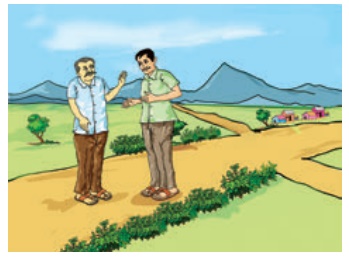
‘When I left our ancestral house, twenty-nine years ago, the house
was almost two hundred years old,’ recollected Aditya. ‘I doubt if even the
school building, which may have undergone many changes, will be recognisable
any more. Trying to revive old childhood memories may prove disappointing!’
But he said he wished to visit the tea shop of Nagen Uncle, if it
still existed, and have a cup of tea there.
So we took the turning to the right and decided to drive to
Bramhapur, of which Aditya’s ancestors were once the zamindars.
a. When did Aditya leave the local school?
b. Why did Aditya think that the school would not be
recognisable?
Aditya’s father had left the ancestral home and moved to Kolkata,
where he had set up his own business. After his death, Aditya was looking after
it, and I was his friend and business partner.
It was the month of Magha, that is January – February by the
English calendar – the middle of winter. By my watch, it was 3:30 in the
afternoon. The sun was soothing. On either side of the road were paddy fields, as far as the eye
could see. Harvest was over and there had been a good crop that year.
After about ten minutes, we came to the local school. Beyond the
iron gates were the playing field and the two-storeyed school building. We got
down from the car and stood in front of the gate.
c. Who were Aditya’s ancestors?
d. How was the landscape through which they travelled.
e. What did Aditya visit?
I asked Aditya whether everything was still the same. He replied
that everything had changed.
‘Our school used to be one-storeyed, and a new building has come
up, which wasn’t there.’
‘Were you not a good student?’ I asked.
‘Yes, but my position was always second,’ he replied. We decided
to go and have tea at Nagen uncle’s tea shop, which stood next to a grocery
shop and opposite a temple dedicated to Lord Shiva. Soon, we caught sight of
‘Nagen’s Tea Cabin’ written on a signboard over the shop.
The owner of the tea shop, now over sixty, a little rustic in appearance, with his
white neatly-combed hair and clean look, was the same as before. He was wearing
a dhoti and a blue striped shirt that could be seen from under a green shawl.
Not recognising Aditya, he asked us where we had come from.
‘Deodarganj,’ Aditya replied. ‘We are on our way to Kolkata.’
A little surprised, Nagen uncle asked why we were there.
‘To have tea at your shop, ’ said Aditya. ‘Certainly, besides tea,
I have biscuits and savouries.’
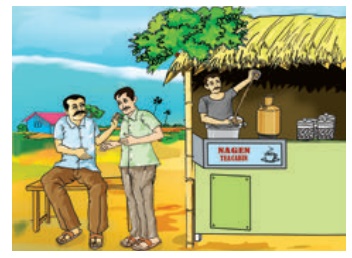
‘Give us two nankhatai each.’.
f. Where was nagen uncle’s shop?
g. Besides tea, what did Nagen uncle have in his shop?
We sat on two tin chairs. There was only one other customer
sitting at a corner table, neither eating nor drinking tea, but sitting with
his head bent, as though he were sleeping.
Addressing him as Mr Sanyal, Nagen uncle reminded him to go home,
as it was already 4 p.m. Other customers would soon be coming. Addressing us he
said, with a wink in his eye, ‘A little hard of hearing. Cannot see well
either. But has no money to buy spectacles.’
From his reaction to this speech, I began to wonder whether Mr
Sanyal was not a little crazy as well, because suddenly he stood up, stretched
himself and, raising his lean right arm, and with eyes dilated, began to recite a poem
by Tagore – Panraksha (‘Keeping of a Promise’). Having recited the poem, he
left the place, making the gesture of Namaste with his hands, to nobody in
particular.
h. What did Nagen uncle tell about Sanyal?
g. In what way was Mr. Sanyal’s behaviour strange?
I noticed a sudden change in Aditya’s expression and I asked him
the reason for it. Without answering me, he asked Nagen uncle who the gentleman
was and what he did.
Nagen uncle replied, ‘Sasanka Sanyal. What can be done? He leads a
cursed life – gone crazy, I think, but has not forgotten any incident of the
past. Sold his lands to get his only daughter married. He lost his wife and
only son last year. Since then he is somewhat changed – not really normal.’
‘Where does he stay?’
‘He stays with a friend of his father’s – Jogesh Kabiraj. Sasanka
comes here, has tea and biscuits and always remembers to pay – having an acute
sense of self-respect. But how long things will remain like this, I don’t
know’.
j. What did Nagen uncle tell
about Sanyal’s past life?
k. How did Sanyal show that he had a sense of self-respect?
Having paid our bill and ascertained the location of Jogesh Kabiraj’s house, we got
into the car. Aditya was at the wheel. He expressed the wish to visit his
house.
‘So you do want to see your house after all?’ I said.
‘It has become essential to do so,’ Aditya replied. His nerves
seemed overwrought for some
reason. We soon reached the house, which was surrounded by high walls. Even
from the ruins, one could easily imagine how grand it must have been once upon
a time.
We entered the building, climbed up the stairs and reached the
attic on the second floor of the house.
‘This was my favourite room,’ said Aditya. The attic has always been a
favourite with children. It is in the attic that the child seems to be in a
world of its own.
A portion of a wall of the attic had crumbled down, and through the
‘window’ that had been created,
we could see the sky, the fields, a part of the rice mill, the spire of the old temple. In
the whole house, the attic had probably been the worst hit by wind and weather. The
floor was strewn with twigs and straw and pigeon droppings. Among other things,
there was a broken cricket bat, the remains of an armchair and a wooden packing
case.
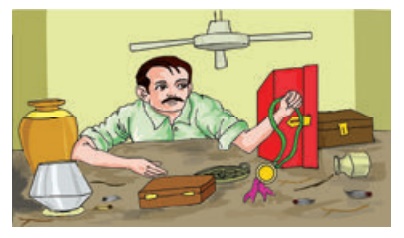
Aditya got on top of the packing case and pushed his hand inside
the ventilator, thus upsetting a sparrow’s nest, a part of which fell to the
ground. However, he heaved a sigh of relief when he had got what he had been
looking for. When I asked him what it was, he said, ‘You’ll get to know very
soon.’
l. Why was the attic ‘a favourite place’ for the children?
m. What did Aditya do on reaching the attic?
We next went to a jeweller’s to find out the weight of the
article. The jeweller remarked that it was an antique. Our next stop was the
house of Jogesh Kabiraj. Though I was a little curious, I didn’t ask Aditya
anything.
We entered the house and went to the room where Sasanka Sanyal
stayed. Sasanka uncle was busy reciting verses from Tagore. When he had
finished, Aditya asked, ‘May we come in?’ He turned and faced us.
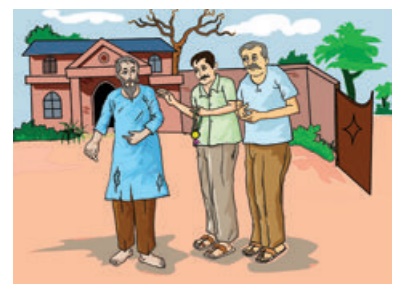
‘No one visits me,’ he said in an unperturbed manner.
‘Would you mind if we come in?’ ‘Come in.’
Except for a charpoy there was nothing else to sit on, so
we remained standing.
‘Do you remember Aditya Narayan Chowdhury?’ Aditya asked him.
‘Of course,’ said the gentleman. ‘’The spoilt child of affluent parents! Was a fairly
good student but could never beat me. He was extremely jealous of me. And he
used to tell lies.’
‘I know,’ said Aditya. He then took out a packet from his pocket
and handing it over to him, said, ‘This is for you, from Aditya.’
n. What did the jeweller say about the article?
o. Was Sanyal happy about his visitors?
‘What is it?’ he asked.
‘Money’.
‘Money?How much money?’
‘One hundred and fifty rupees. He has said that he will be happy
if you accept it.’
‘Shall I laugh or cry? Aditya has given me money! Why this sudden
generosity?’
‘Man does change with time. Perhaps Aditya is not the same Aditya
as before?’
‘A change? I got the prize. He could not bear it. He took it from
me to show his father and never returned it to me. Said that there was a hole
in his pocket and it had fallen through it.’
‘This is the price of the medal. It is yours.’
Sasanka Sanyal was amazed. He stared at Aditya and said, ‘The
price of the medal? That could not be more than five rupees. It was a silver medal.’
‘Silver is now thirty times costlier than before.’
‘Really? I had no news of that. But …’
Sasanka uncle looked at the fifteen ten-rupee notes in his hand
and then looked at Aditya. There was a completely new expression on his face.
He said, ‘Aditya, this smacks too much of charity. Doesn’t it?’
We remained silent. Peering intently at Aditya, Sasanka Sanyal
smiled and said, ‘I had recognised you at Nagen uncle’s tea shop by that
mole on your right cheek. I could see you had not recognised me. So I recited
the same poem that I had recited on the prize-giving day, on purpose, so that
you may remember. Then, when you came to visit me, I couldn’t help venting my
anger on you.’
‘You have done the right thing. Your grievances are absolutely
justified. But I will be happy if you accept the money,’ said Aditya.
Sasanka Sanyal shook his head and said, ‘No. Money will soon be
spent. I would have preferred to have the medal if it were possible. I would
have forgotten that unpleasant incident of my childhood if I could get the
medal back.’
So, the medal that had been hidden in the attic for twenty-nine
long years was eventually restored to its owner.
‘Sriman Sasanka Sanyal – Special Prize for Recitation - 1948’ was
still clearly engraved on it (Translated from the Bengali story
Chilekotha)
p. Why did Sanyal recite the poem in the tea shop earlier?
q. What was engraved on the medal?
About the Author:
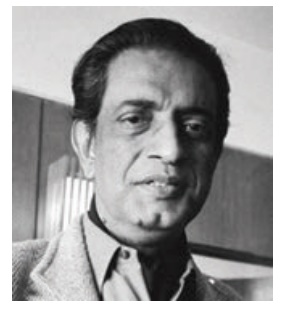
Satyajit Ray (1921 - 1992) was an Indian
film maker, screen writer, graphic artist, music composer and author. He
was born in Kolkatta. He authored several short stories and novels meant
primarily for young children and teenagers. He revived the children’s magazine
‘Sandesh’ (which his grandfather had started in 1913) and edited it until his
death in 1992. Ray was more interested in writing, rather than film making. His
stories have been translated in Europe, the United States and many other
countries. Ray received many awards including 32 national film awards by the
Government of India, notably the Padma Bhushan in 1965 and the highest civilian
honour ‘Bharat Ratna’ shortly before his death.
Related Topics